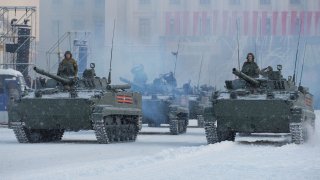Why Restraint With Russia Won’t Work
Only by imposing real costs on Russian malfeasance can the West expect to prevent further escalation.
The latest round of Russian nuclear threats has sparked renewed calls to limit military assistance to Ukraine to prevent international escalation of the Russo-Ukrainian war. The Biden administration, together with commentators on both the Right and Left, have argued that Western restraint is necessary to avoid a nuclear conflict. Such warnings have been echoed by Russian President Vladimir Putin, who contended in late May that “Constant escalation can lead to serious consequences.”
However, rewarding Russian aggression is more likely to escalate conflict with Russia than to create any kind of durable peace. Calls for caution blind us to the very real danger that limiting Ukraine’s ability to respond to Russian aggression will make a broader European or global war more likely by reducing the perceived costs of Russian escalation.
Support for shackling Ukraine in the face of Russian attacks rests on the belief that Russia will somehow reward Western prudence and that if we back down in the face of nuclear threats, Russia will stop making such threats. But if threats of nuclear war cause the West to put more limits on Ukraine, why would Russia stop making such threats? If Russia thinks it can engage in aggressive behavior without cost, it will probably engage in more aggressive behavior.
Indeed, Russia’s full-scale invasion in February 2022 was provoked in part by Western weakness and restraint rather than belligerence. Great Britain did little to punish Russia after it murdered a British citizen on British territory in 2006. Then, Western powers responded with extraordinary restraint after the Russian government blatantly violated core international norms by invading sovereign Ukrainian territory and seizing Crimea in 2014. In the first two years after the war, American lethal military assistance remained limited. Sanctions against Russia had little noticeable impact on the Russian economy.
Simultaneously, the German government refused to halt construction of the Nord Stream 2 pipeline linking Germany to Russia’s Gazprom. Russia remained Europe’s largest supplier of gas.
German politicians in both major parties remained riddled with politicians close to Russia. French and Italian politicians on both the Right and the Left supported closer relations with Russia. In particular, Putin maintained close personal ties with European leaders—including Hungarian prime minister Viktor Orban, former Italian prime minister Silvio Berlusconi, and former German chancellor Gerhard Schroeder.
The United States and its allies did ultimately provide lethal assistance and helped train the Ukrainian military. However, the government did not provide its most advanced weapons and did nothing to move Ukraine closer to NATO membership. In the months before the February invasion, Russian state media itself admitted that Ukraine’s NATO Membership was “unrealistic” and that, despite promises of admission made in 2008, “over the past twelve years, Kyiv…[has] moved away from the prospect of joining the alliance.”
However, Western restraint was not rewarded. Rather than responding reciprocally by reducing tensions, Putin, of course, invaded Ukraine in February 2022. The Russian government did this not in response to Western threats but almost certainly because they assumed the West was too weak and passive to respond effectively. After all, Putin had important allies in the European elite and controlled access to key European energy resources. Western restraint in response to Crimea did not constrain Russia but very likely escalated the chances of Russian aggression.
And so it is today.
Western powers have done little to respond to concerted Russian efforts to foment global chaos, including the severing of communications cables between Lithuania and Sweden and plots to send incendiary devices to the United States and Canada. If we want to stop Russia from invading sovereign countries and sowing instability in Europe and the United States, we must make such behavior costly. That is ultimately the best way of preventing escalation.
Lucan Ahmad Way is a Distinguished Professor of Democracy in the Department of Political Science at the University of Toronto and a Fellow of the Royal Society of Canada. He is also the Co-Director of the Petro Jacyk Program for the Study of Ukraine at the Centre for European and Eurasian Studies.
Image: Karasev Viktor / Shutterstock.

